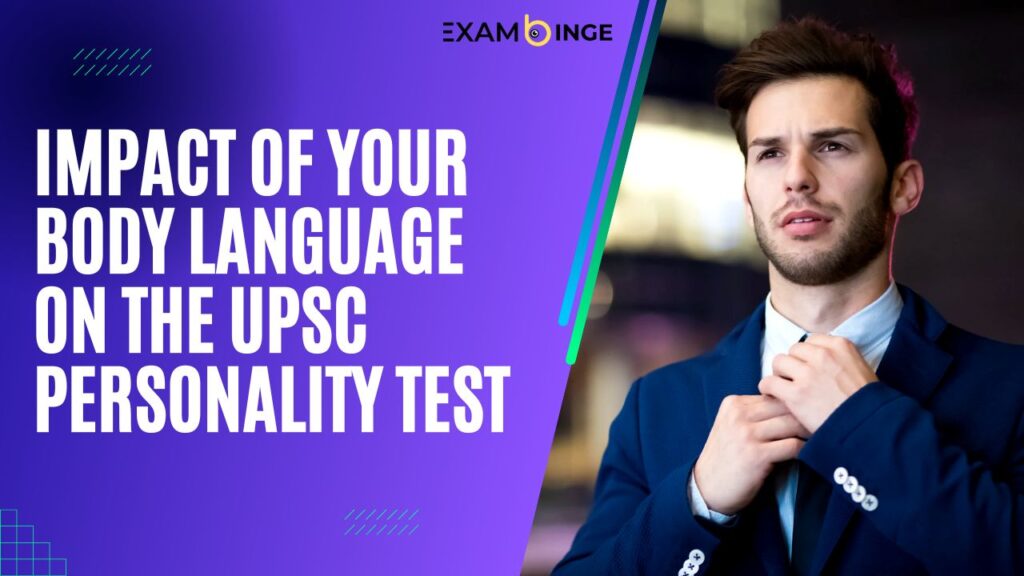Introduction
Cracking the Union Public Service Commission (UPSC) exam is a dream for millions of aspirants in India. While the written exams test your knowledge and analytical abilities, the Personality Test (or interview stage) evaluates your overall demeanor, communication skills, and suitability for the role of a civil servant. In this crucial stage, your body language can make or break your chances of success.
Often overlooked, body language in the UPSC Personality Test plays a significant role in shaping the panel’s perception of you. Non-verbal cues such as posture, eye contact, gestures, and facial expressions communicate confidence, honesty, and professionalism — qualities expected in a future civil servant.
In this blog, we’ll explore how body language influences your performance, practical tips to improve it, and strategies to leave a lasting positive impression on the interview panel.
1. Why Body Language Matters in the UPSC Personality Test
Body language refers to the non-verbal communication that complements your verbal responses. During the UPSC interview, the panel not only evaluates what you say but also how you present yourself. Here’s why body language matters:
- First Impressions: A confident handshake, upright posture, and a pleasant smile set the tone for the interview.
- Reinforces Verbal Communication: Positive body language adds weight to your words, making your answers more convincing.
- Reflects Emotional Stability: Calm and composed body language shows that you can handle stress and pressure.
- Builds Trust: Open gestures and steady eye contact indicate honesty and transparency.
- Shows Confidence: A confident demeanor reassures the panel of your suitability for a leadership role.
2. Key Aspects of Body Language to Focus On
To excel in the UPSC Personality Test, focus on these crucial aspects of body language:
| Aspect | What to Do | What to Avoid |
|---|---|---|
| Posture | Sit upright, slightly lean forward to show engagement. | Avoid slouching or leaning back excessively. |
| Eye Contact | Maintain natural and steady eye contact with panel members. | Avoid staring or looking away too frequently. |
| Facial Expressions | Keep a pleasant and calm expression. Smile when appropriate. | Avoid frowning or looking disinterested. |
| Hand Gestures | Use controlled, open gestures to emphasize points. | Avoid excessive or aggressive hand movements. |
| Tone of Voice | Speak clearly with a moderate tone and pace. | Avoid mumbling or speaking too fast or loud. |
3. Tips to Improve Your Body Language
Here are actionable tips to enhance your body language for the UPSC Personality Test:
a) Prepare Through Mock Interviews
Participate in mock interviews to practice your non-verbal cues. Get feedback from mentors on aspects like posture, eye contact, and gestures. Repeated practice builds confidence.
b) Practice Mindfulness
Being mindful of your emotions helps you stay calm and composed during the interview. Practice deep breathing exercises or meditation to reduce nervousness and improve focus.
c) Dress Professionally
Your attire is an essential part of your overall presentation. Choose formal, neatly pressed clothes that make you feel confident. Remember, your outfit contributes to the first impression.
d) Mirror Practice
Stand in front of a mirror and rehearse common interview questions. Observe your facial expressions and gestures to ensure they align with your answers.
e) Maintain Composure
If faced with a tough question, take a moment to gather your thoughts. Avoid fidgeting, tapping your feet, or showing signs of frustration.
4. Common Body Language Mistakes to Avoid
Even the most prepared candidates can make body language errors. Here are common pitfalls and how to avoid them:
- Fidgeting: Avoid tapping your fingers, playing with a pen, or shifting in your seat excessively.
- Crossed Arms: This can make you appear defensive or closed off. Keep your arms relaxed.
- Overly Rigid Posture: While slouching is bad, being too stiff can make you appear uncomfortable.
- Avoiding Eye Contact: This might give the impression of nervousness or dishonesty.
- Overuse of Gestures: While gestures add emphasis, excessive use can be distracting.
5. The Psychological Impact of Body Language
Body language doesn’t just affect how others perceive you; it also influences how you feel about yourself. Research shows that adopting confident body language can:
- Boost Self-Confidence: Standing or sitting in a power pose can reduce anxiety and improve self-esteem.
- Reduce Stress: Deep breathing and maintaining a calm posture lower cortisol levels, reducing stress.
- Enhance Performance: Positive body language improves overall communication, making your responses more impactful.
6. How to Use Positive Body Language During the Interview
Here’s a step-by-step approach to using positive body language in the UPSC Personality Test:
- Before Entering the Room:
- Take a deep breath to calm your nerves.
- Knock gently and wait for permission to enter.
- Walk in with a confident gait and greet the panel with a smile.
- During the Interaction:
- Sit down only after being invited.
- Place your hands lightly on your lap or the armrest.
- Maintain steady eye contact with all panel members.
- Nod subtly to show attentiveness while others are speaking.
- Answering Questions:
- Use natural hand gestures to emphasize your points.
- Pause briefly if needed, instead of rushing into an answer.
- Smile when appropriate to show enthusiasm and approachability.
- Exiting the Room:
- Thank the panel politely and leave the room confidently.
- Avoid rushing or slouching on your way out.
FAQs About Body Language in UPSC Personality Test
Q1: Why is body language important in the UPSC Personality Test?
Body language is essential as it reflects confidence, emotional stability, and professionalism — qualities that the panel looks for in a future civil servant.
Q2: How can I improve my body language for the interview?
You can improve by practicing through mock interviews, maintaining proper posture, using controlled gestures, and practicing mindfulness to stay calm.
Q3: What are common body language mistakes to avoid?
Avoid fidgeting, crossing your arms, slouching, avoiding eye contact, or using excessive gestures during the interview.
Q4: Can positive body language improve my confidence?
Yes, adopting confident body language can boost self-esteem, reduce stress, and enhance overall interview performance.
Q5: How should I handle nervousness during the interview?
Practice deep breathing, focus on maintaining a calm posture, and take a moment to compose yourself before answering challenging questions.
Conclusion
Body language in the UPSC Personality Test is a critical factor that can significantly influence your performance. It’s not just about what you say but also how you present yourself. A confident posture, steady eye contact, and composed demeanor can leave a lasting positive impression on the panel.
Remember, body language is a skill that can be developed with practice. By focusing on your non-verbal cues and aligning them with your verbal responses, you can showcase the qualities of a capable and confident civil servant. Take the time to refine your body language, and you’ll be one step closer to achieving your dream of serving the nation.
If you enjoyed this blog, don’t miss out on our previous one How to Use Your Hobbies to Nail the UPSC Interview – Here’s the Secret!




